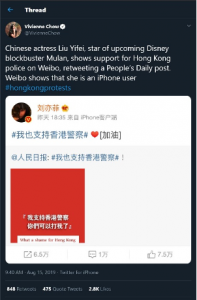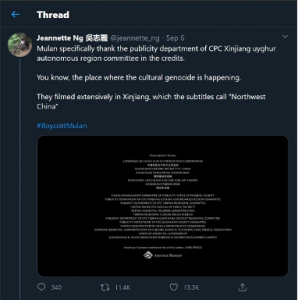Cancel Culture Hits Disney’s Mulan- An Explanation
Canceled.
One of the most feared words in 2020.
Public relations professionals know this two-syllable word can send disastrous shockwaves that can damage even the most beloved brands.
Since its debut on Sept. 4, Disney’s live-action Mulan has just earned $43.8 million, nowhere near its production cost of $200 million. The Mickey Mouse powerhouse has seen massive success with live-action remakes such as Cinderella and Sleeping Beauty, so why did Mulan flop?
Overall, 71 percent of consumers prefer brands that align with their values and beliefs. In comparison, 82 percent of millennials, which is arguably the target audience for Mulan, “stresses the importance of value alignment.” The remake of the ancient ballad failed to align and even contradicted people’s ideals.
First off, the star of the movie Lui Yifei shared, “I support the Hong Kong police, you all can beat me up now,” on Weibo, a popular Chinese social media platform. Many in Hong Kong saw Yifei’s actions as support for police brutality in the region and support for the Chinese government, which passed an last year that sparked the ongoing Hong Kong protest. Pro-democracy activists took to social media pushing the hashtag #BoycottMulan, which trended on Twitter worldwide. Soon after the hashtag trended in China, Lui gave , “I think it’s obviously a very complicated situation and I’m not an expert. I just really hope this gets resolved soon.” When further questioned, her rehearsed answer was, “I think it’s just a very sensitive situation.”
The actions of Mulan’s star are not the only downfall for the movie. Since 2017, more than 1 million Uyghur Muslims have been placed in internment camps within the Chinese autonomous region of Xinjiang. The government denied the existence of these camps, “but after images of camp construction with watchtowers and barbed wire fences emerged, the government acknowledged what they called ‘re-education centers’ for Uighurs.” Many who were detained say they were interrogated and beaten because of their religion. of forced labor and ethnic cleansing have emerged. H&M recently cut ties with suppliers in Xinjiang because of these finds. Still, Disney filmed parts of the movie in the region and thanked the “Publicity Department of CPC Xinjian Uyghur Autonomous Region Committee” in the ending credits. Disney’s Head of Finance Christine McCarthy responded to the controversy by stating, “The real facts are that Mulan was primarily shot — almost in entirety — in New Zealand.” In an effort to accurately depict some of the unique landscape and geography of the country of China for this period drama, we filmed scenery in 20 different locations in China. It’s common knowledge that, in order to film in China, you have to be granted permission. That permission comes from the central government.” So, in our credits, it recognized both China and locations in New Zealand. I would just leave it at that, but it has generated a lot of issues for us.” To accurately represent the culture in Mulan, of course, it had to be filmed in China. However, there was no need to film in Xinjian, as there are many more culturally rich, beautiful provinces in the country.
Thirdly, the movie, which highlights Chinese culture, was directed by a white woman. While a women director is a huge strive, the fact remains that Niki Caro is a New Zealand native. Even though Caro mentioned she would work with experts in Chinese Culture, the movie has adopted a poor reception in China, one of the key markets for Disney. A Chinese film critic said, “The Americans invited all the famous Chinese actors they could think of and piled together all the Chinese elements that they could find to create this car crash. It’s full of Western stereotypes and conjectures about China, and particularly ancient China.” If Disney wanted this movie to accurately represent Chinese culture, they should have chosen a Chinese director. Now, they are facing the consequences, with Mulan projected to gross only $38.5 million in China.
Disney, beloved brand by all, is a perfect example of the fact that no company is safe from being canceled. The actions of Lui Yifei, the movie being filmed in Xinjiang and the movie being directed by a white woman gave off great dissonance among Disney lovers. This goes to show that companies need to take diverse audience reception into account. As professional communicators, we can use our voice to continue advocating for just practices and cultural sensitivity within our companies.
 Mauricio Lira is a senior and founding treasurer of Texas Tech University PRSSA. Mauricio is majoring in Public Relations with a minor Spanish. Currently, he is part of the 4A’s Multicultural Agency Internship Program and Digital Engagement Intern at Texas Tech University.
Mauricio Lira is a senior and founding treasurer of Texas Tech University PRSSA. Mauricio is majoring in Public Relations with a minor Spanish. Currently, he is part of the 4A’s Multicultural Agency Internship Program and Digital Engagement Intern at Texas Tech University.



Although I understand the intent behind this article, I truly don’t understand how and why you all thought it was okay to allow a non-Chinese person to report and speak on this as if this directly impacted their life. The conversation about cultural insensitivity is relevant but extremely ironic considering that this publication sounds like someone is using their individual perspective to shame an entire country and it’s behavior. Regardless of what the behavior is, it’s not okay for someone that isn’t from that culture to criticize it.